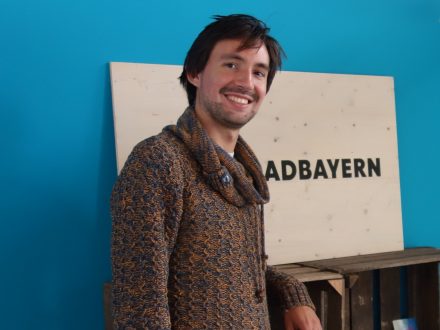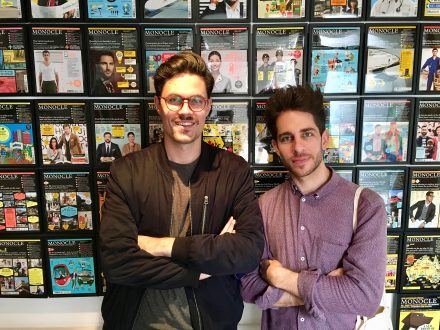Fake news and cries about “lying press,” dwindling advertising revenue and digital transformation: the media industry is in a state of upheaval. Media Lab Bayern supports startups that develop new solutions for the media industry. We spoke with two young companies at the Munich-based media accelerator.
The founders of TheBuzzard.org, Felix Friedrich and Dario Nassal, nearly became traditional journalists. They studied political science while also working in radio and for daily newspapers. The path to journalism, however, was not enough for Dario Nassal:
“We are interested in diverse, authentic perspectives on politics and wanted to know what people were writing beyond the major media companies. I still find it extremely important to be aware of different perspectives on world affairs: what are bloggers, activists and academics saying — from all areas of the political spectrum? That gives a more realistic picture compared to reading just one journalist’s point of view, as is the case with a classic daily paper.”
The decision not to pursue a traditional career in journalism came from a kind of idealism, said Nassal:
“Writing a single story makes less of an impact when compared to building an entire platform.”

With their co-founder, software developer Alexander Diete, Friedrich and Nassal have developed a platform that gathers various opinions, views and perspectives on a topic. TheBuzzard aims to show media consumers diverse perspectives that differ from their own. The fact that news consumers have access to so much information online often leads to the personalization of content, commented Nassal:
“We increasingly only see what we like or our friends like. Of course Snapchat or WhatsApp are particularly exclusive, but magazines are also personalizing more and more.”
TheBuzzard would like to broaden public discourse, bring more perspectives into the game and pop filter bubbles. Creating a company that generates revenue and follows a strategy was not the founders’ initial intention. That makes TheBuzzard a classic case in terms of media startups: the solution is created first and then the company.
The startup will be located in the Media Lab Bayern until the end of the year. The accelerator of the Bavarian regulatory authority for new media (Bayerische Landeszentrale für neue Medien – BLM) provides office space, financial support and coaching.
Turning a solution into a startup
Picter will also be working at the Media Lab until the end of the year. The company is developing a platform for photo file logistics. Co-founder Simon Karlstetter explained the principle:
“Until now, working with photo files has been extremely complicated and inefficient. The producer, for example a photographer, has high-resolution photos that they cannot send to anyone because the files are simply too large.”
He added that every recipient has different needs and requirements. This requires the photographer to save the data in various file sizes and different resolutions to send them to end users. That does not only lead to a tremendous amount of unnecessary file duplicates, but Karlstetter also added:
“It also costs time and money. And that is exactly where Picter comes in. Picter makes sending image files superfluous. Photographers upload their pictures once on Picter where they can then give access as they please to the high-resolution files that are stored safely in the cloud. Picter sends the proper resolution to fit the recipient’s intended purpose.”

The founders came up with the idea for the platform because they needed the solution themselves: the Picter founders are also behind the non-profit photography magazine Der Greif, which is celebrating its ten year anniversary this year. Being editors themselves means the founders have experienced first-hand how difficult it can be to work with photo files on a large scale:
“We receive photos from around the world. We have to make sure that the files are available in the right size at the right time. We also have to ensure that the photos can be used without causing any legal issues. So we created a system to efficiently tackle the subject. We only noticed afterwards that we had solved a problem with our system which is also faced by other organizations that are much bigger than us.”
“You learn the most by doing something.”
The commercial aspect is an obvious weak spot among young founders in the media industry. This is where the Media Lab Bayern supports its fellowship participants in the form of coaching and workshops. Dario Nassal from TheBuzzard reported:
“When we came to the Media Lab, we were still total newbies. We did not deal with math or economics at university. When we decided to build the platform, we did not spend any time thinking about whether or how we could earn money with it. We owe quite a lot to the Media Lab.”
Step by step, the founders learned how to create a business plan and a pitch deck, and how to plan their finances.
“We first learned what lean working meant here. We developed the actual platform based on user feedback. As soon as you are in the world of entrepreneurship, it is like wearing glasses. I understand how companies function so much better now.”
Things were easier for Picter. Working on their magazine Der Greif had already laid the foundation for the startup, commented Simon Karlstetter:
“Even though Der Greif is not commercial, up to ten people are sometimes involved in producing the magazine. That requires internal structures. We were able to use a lot of that experience with Picter. We had worked with a large number of customers before, and negotiations and pricing had become a part of daily business. The network and reputation we established with Der Greif has also been a major advantage for Picter. We’ve been part of the photography scene for ten years and were able to establish good international contacts. Something that was new for us was the topic of investors.”
Picter has also benefited from the workshops and exchange of ideas at the Media Lab:
“It also really helped us to work outside of our bubble, for example by developing sales strategies. You learn the most by doing something.”
Karlstetter mentioned that it was important for Picter to try things within the safe environment provided by the Media Lab. But, startups need to start earning money when they leave the lab environment at the very latest.
Several sources of income to secure finances
Despite all of the crises in the media industry, it is possible to earn money with innovative solutions. Monetizing its own service was never a problem for Picter. An excellent network in the international photography scene certainly helped the company gather momentum. They were able to gain organizations as paying customers from the very beginning. The founders are also currently exploring additional sources of income.
TheBuzzard is still relying on a combination of different sources of revenue: the Media Lab provided startup funding as part of the fellowship. The Vocer Innovation Medialab, a grant program for innovation in the realm of media, is also supporting the startup. With 50,000 euros worth of funding from the Google Digital News Initiative, TheBuzzard is continuing development of its algorithm, which rates and evaluates journalistic texts. The young company is also relying on various sources of income, with plans for a professional version of the debate review to deliver additional cash flow on a monthly basis. Dario Nassal also added that they are currently negotiating with Bundestag offices, political foundations and media companies that are looking for a systematic digital press review on different subjects.



